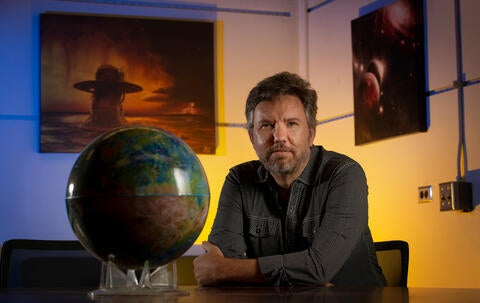Stephen Kane, professor of planetary astrophysics, has been elected to the American Astronomical Society’s 2025 class of fellows -- the first time such an honor has been awarded to a UCR faculty member.
The society was established in 1899, and being elected to its annual class of fellows is an honor bestowed each year on less than 0.5% of the society’s membership.
Kane was elected to the 2025 class of 24 fellows not only for his individual contributions to astronomical science in the areas of planetary habitability, exoplanet detection, and insights into Venus, but also for leading productive collaborations between astrophysicists and planetary scientists.
“You would think of astronomers as planetary scientists or vice versa, but that just isn’t the case,” Kane said. “Planetary scientists are much more related to geologists, while astronomers are much more related to physicists. Historically they don’t talk to each other a lot. However, I’ve been organizing conferences to bring these communities together.”
Kane’s research is wide-ranging. He works to locate planets orbiting other stars, to understand the factors affecting the shape of a planet’s orbit around a star, and to learn about factors that could make another planet habitable for life as we know it. For Kane, all of this work is relevant to his research on Venus, and the factors that have contributed to the runaway greenhouse state on Earth’s sister planet.
Venus is Earth’s closest planetary neighbor, and both feature nearly the same size, mass, and rocky composition. Yet, one could describe the thick, toxic atmosphere and extreme heat on Venus as a hellscape.
Gaining clarity about the factors that contributed to the Venusian atmosphere could help improve models of what may one day happen to Earth, and what may already be happening on farther-flung planets.
“For me, a lot of the work is about understanding Venus in the context of climate change and planetary habitability, and what it could mean for our understanding of life in the universe,” Kane said.
“As we have seen over the past few days, particularly here in California, the effects of climate change on life are incredibly far-reaching,” he said. “I’m hoping my election to the 2025 class of Fellows will highlight the need for more of this kind of work and will elevate UCR’s role in it.
Kane hails from Tamworth, a town in the Australian outback. He completed his undergraduate studies in physics and astronomy at Macquarie University in Sydney, and his Ph.D. work at the University of Tasmania as well as Johns Hopkins University. In 2008 he became a research scientist at the NASA Exoplanet Science Institute, and he joined UCR in the summer of 2017.
The AAS is based in Washington, D.C., and comprises about 8,200 individuals including physicists, mathematicians, geologists, engineers, and others whose research and educational interests lie within the astronomical sciences. Its fellowship program is relatively new, having been inaugurated in 2020.
